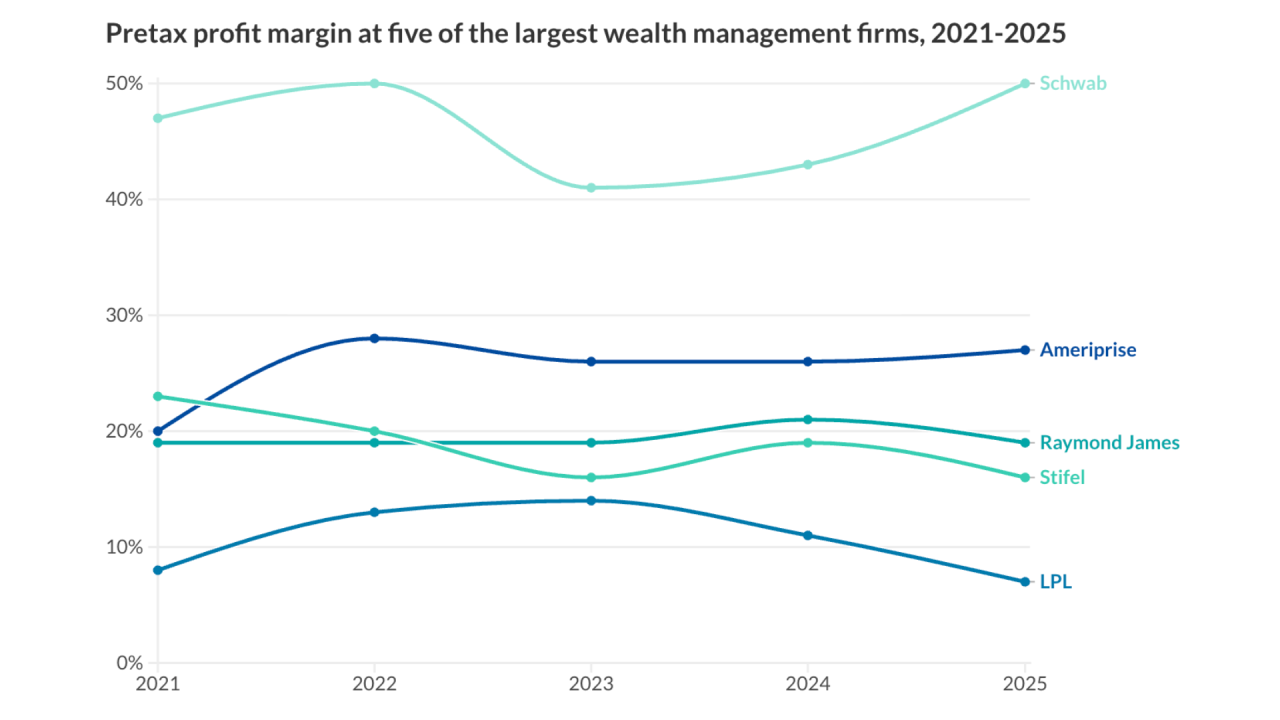Financial planners have long relied on assets under management (AUM) fees as the foundation of their businesses. But as more independent RIAs enter the market, alternative fee models are gaining traction.
Among the most popular are
Those who've made the switch say it's working well, but not everyone is convinced the model is sustainable.
Jon Luskin, founder of San Diego-based Luskin Financial Planning, said the model appealed to him due in part to its simplicity — cutting out time-consuming admin tasks and the need for frequent client check-ins. Through his practice, Luskin offers a one-day financial review for a one-time fee of $4,695.
Other advisors who have adopted the model point to similar incentives behind their decision.
Chandler Fugate-Laus, founder of RIA moneyfluent in Columbus, Ohio, said fixed-period planning helps resolve two major challenges advisors often face with ongoing clients — starting with the pressure of annual reviews.
"They're paying you an ongoing fee, and you feel pressured to constantly be providing value. … But the thing is, they have everything they need," Fugate-Laus said. "And so I wonder if we're overworking just to feel like we're providing value, and I think that

For advisors, working with ongoing clients often also means chasing them down for documents, she said. In her practice, Fugate-Laus offers a $4,200, six-month planning period.
"I found with this six-month program that we're keeping momentum. People know this only lasts six months, and I'm meeting with my clients on an almost monthly basis," she said. "They're hearing from me every few weeks. We're talking. We've got a rapport. They're talking to me regularly, and they don't really ever fall off the map where I feel like I'm chasing after them, and that's one of those parts of the job that I really don't miss."
Still, for all the benefits that fixed-period planning offers, it isn't without its limitations.
A problem of scale
On online forums like Reddit's r/CFP, discussions of flat-fee, advice-only planning tend to elicit strong feelings from advisors on either side of the debate. For the AUM devout, flat-fee services present fundamental issues when it comes to scaling an advisory practice.
"If you want to intentionally create a business that doesn't benefit from the leverage the [AUM] fee model provides you, more power to you," one advisor wrote. "You'll just
That tension exists across flat-fee planning models, and fixed-period planning is no different. Without ongoing engagements, Fugate-Laus described the model as a "revolving door" of income.
Other advisors share that experience.
"That is a concern that you sort of constantly have to be prospecting and bringing in new people for this to work," said Ashley Rittershaus, founder of Curious Crow Financial Planning in Revere, Massachusetts.
Growth is not always the goal
When each client engagement has an expiration date, it can be difficult for fixed-period advisors to expand their business. But for advisors like Rittershaus, the limited ability to scale is a feature — not a flaw.

"Personally, I'm thinking of this as more of a lifestyle business," Rittershaus said. "I don't have plans to scale and grow a huge amount, but I'm just figuring out the right capacity that's sustainable. … I want to have flexibility in my day. I don't want to be working 80 hours a week."
Fugate-Laus shared that sentiment.
"My goal is not just to scale," she said. "I founded moneyfluent so that I can live according to my values and work with the people that I want to work with. And I strongly believe that doing so with this program that I've created is the best way to do that."
Some clients remain distrustful of AUM fees
Along with the benefits that flat-fee, fixed-period planning services offer to advisors, they say a significant share of clients are also happier with the intuitive nature of the fee structure compared to an AUM fee.
In her discussions with clients, Fugate-Laus said she often hears the sentiment that AUM fees are
"I try to disabuse them of that, because I think AUM has its place and can be a good fit for some people, but [clients say] it doesn't feel like they're in control," Fugate-Laus said. "It feels like maybe there's some sort of sneaky way of being charged, even though that's not the case. It is quite transparent. It just feels that way. And so I like, and I think my clients like, that we just sidestep that whole thing."







